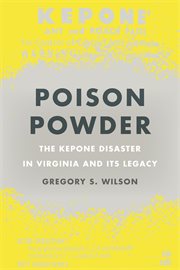Nonfiction
eBook
Details
PUBLISHED
Made available through hoopla
DESCRIPTION
1 online resource
ISBN/ISSN
LANGUAGE
NOTES
In 1975 workers at Life Science Products, a small makeshift pesticide factory in Hopewell, Virginia, became ill after exposure to Kepone, the brand name for the pesticide chlordecone. They made the poison under contract for a much larger Hopewell company, Allied Chemical. Life Science workers had been breathing in the dust for more than a year. Ingestion of the chemical made their bodies seize and shake. News of ill workers eventually led to the discovery of widespread environmental contamination of the nearby James River and the landscape of the small, working-class city. Not only had Life Science dumped the chemical, but so had Allied when the company manufactured it in the 1960s and early 1970s. The resulting toxic impact was not only on the city of Hopewell but also on the faraway fields where Kepone was used as an insecticide. Aspects of this environmental tragedy are all too common: corporate avarice, ignorance, and regulatory failure combined with race and geography to determine toxicity and shape the response. But the Kepone story also contains some surprising medical, legal, and political moments amid the disaster. With Poison Powder, Gregory S. Wilson explores the conditions that put the Kepone factory and the workers there in the first place and the effects of the poison on the people and natural world long after 1975. Although the manufacture and use of Kepone is now banned by the Environmental Protection Agency, organochlorines have long half-lives, and these toxic compounds and their residues still remain in the environment
Mode of access: World Wide Web







